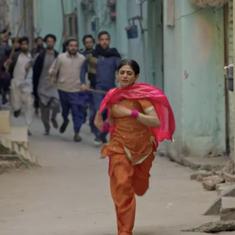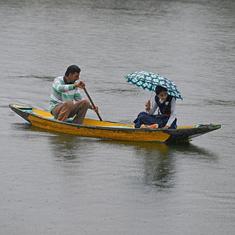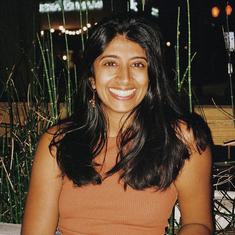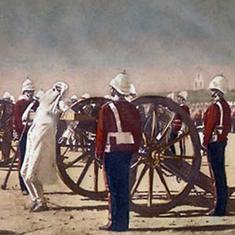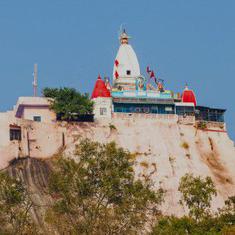“A life-size statue of Michael Madhusudan Dutt, a prominent Bengali poet during the 19th century Bengal renaissance, was found defaced in Raniganj of West Bengal’s Purba Bardhaman district on Saturday, police and eye-witnesses said. Dutt’s face was smudged with red colour by unknown miscreants, triggering condemnation in the political circles as also among the locals.”
— From a news report on NDTV.com
Translator’s introduction
In 1862, Michael Madhusudan Dutt published a collection of poems titled Vīrānganā Kāvya. The previous year, 1861, had seen the publication of his seminal Meghnād Badh Kāvya, a volume that redefined Bengali poetry in its use of the innovative blank verse or amitrākṣar chanda and in the way it retold the Rāmayana with Rāvana as the central protagonist.
Since the death of Bharat Chandra Ray, there had been no Bengali epic poetry, a gap Meghnād Badh Kāvya fulfilled. Yet the response to this epic poem was not uniformly positive. Dutt was already a controversial figure in many ways. Born into an affluent family, he was a product of the intellectual environment of Hindu College in the mid-nineteenth century. The 1830s was a time when Hindu College gave birth to a proto-nationalist and yet also anti-traditionalist group of young intellectuals, “Young Bengal”.
Young Bengal left an impact on Dutt, who joined Hindu College in 1837, five years after the death of Derozio. Dutt’s conversion to Christianity, and his sense of affiliation to the Western classical canon and to contemporaneous Romantic poets in England would eventually lead him to a path of disillusionment, until he came back to the mother tongue.
A great deal of critical attention has also been given to the spectacular achievement of Meghnād Badh Kāvya and its innovations in terms of both style and content. Seen as the culmination of his poetic talent, most nationalists were quick to adopt this text as the defining moment of anticolonial thought, a moment when Bengal could claim to have given birth to a national poet. Miltonic, they called him, for attempting to rewrite the Rāmāyana as Paradise Lost.
The poems of Vīrānganā Kāvya were shorter pieces of blank verse, each written as an address by a woman from Purānic myth to her lover or husband. These poems were composed keeping in mind a literary model that Ovid had set in Heroides, where mythical women addressed affects of love, desire, parting and revenge through imaginary letters. Dutt adopted this basic structure and then raised his own questions within this narrative structure.
As Asit Kumar Bandyopadhyay has pointed out, “The women might have been Purānic, but the main thematic was a modern sense of autonomous individualism. The recurrent tropes are women driven mad with illicit love, or weak with lust for the presence of her lover, and even a woman enraged and rebuking her weak husband. Through their expositions, what comes across is that these are women with a sense of modern materialistic, questioning, independent thinking. Somehow there must be a link with the awareness of the women’s question in the nineteenth century.”
Dutt’s public role as a very successful playwright has rarely been seen in conjuncture with his status as a conflicted poet trying to reformulate the content and structures of Bengali poetry within Bengalis. It was only with the staging of his Sermista (1859) in 1873 that professional women players appeared on the Bengali stage for the first time. This incident was one of the episodes when Dutt yet again fell out with the pundit, social reformer and lexicographer Ishwar Chandra Vidyasagar.
In 1873, a wealthy theatre enthusiast named Saratchandra Ghosh founded the Bengal Theatre and instituted a respectable committee of luminaries of the time to give credibility to his venture. Thus the committee comprised Umeshchandra Dutt, Pundit Satyabrata Samashrami, Vidyasagar and Michael. Michael insisted that women be hired to play in Sermista, but the only actresses who could be hired were prostitutes. This led to Vidyasagar’s resigning from the committee, and he was never associated with the stage again.
This incident can give us insight into the extent of liberal reforms, pertaining to women, which the social world of the Bengali bhadralok would actually subscribe to. It also tells us about how deeply anti-establishment and anti-authoritarian Dutt was in terms of understanding the gender question. But he had a terribly good sense of humour, our Michael. He dedicated Vīrānganā Kāvya, steamy in many parts, to his kind benefactor and frenemy, Vidyasagar.
I have translated the fourth long narrative poem of the collection, an address to Dasaratha, by Kaikeyi. I chose this poem because it is one of the most popular poems of the Vīrāṅganā Kāvya, heavily anthologised and included in school textbooks. I find it intriguing why this is so, despite the fact that Kaikeyi is portrayed as a manipulative queen, desperate to secure her son the kingship. In the process however, we see her immense rhetorical skills, and her ability to convince the king – and the reader – of her rights as devoted wife and queen.
Her powerful abilities of argumentation are not the only interesting aspect to this poem and her characterisation. We also notice how she evokes pathos through reproaching the king for no longer valuing her since she is no longer young. In a highly explicit passage, she reminds him that with loss of youth and sexual appeal, women are no longer treasured. Again, she tries to convince the king to stray from the path of dharma. What this dharma constitutes however is never made explicit by her.
The famously oblique last line is especially hard to translate “bicār karun dharma dharma-rīti-mate” where mat could refer to both “according to/in that way” as well as “opinion/creed.” She thus suggests that dharma could be both universal as established by custom or usage, but ultimately it had to be the king’s own subjective opinion or creed. Her sophistry, her unabashed discussion of the decline in her sexual beauty and her concomitant claim that this leads to a loss of feminine value in the context of the male gaze, all go towards establishing a powerful female subjectivity.

Kaikeyi to Dasharath
What words do I hear on Manthara’s lips today,
O Raghuraj? Yet the servant is sprung of base origins,
It is not possible that she will know right from wrong!
You tell me –
why are all the citizens today
Immersed in an ocean of delight? Some spread
Petals on the royal pathway; and some string together
Buds and flowers and fruits and leaves together
To decorate their doorways—
as if a carnival.
Why do these flags fly high on every roof?
Why are the infantry, the horses, the elephants, the chariots, and
The charioteers decked in the finery of war?
And why do they
Blow these trumpets of battle? Why do the women of this city
Ceaselessly and loudly celebrate everywhere?
Why do dancers dance, and the singers sing?
Why must this music emanate from the veena?
Speak, husband, let me hear you,
I beg you: speak to me!
What vow must be followed today
By the greatest of the race of Raghu? Tell me, O Jewel of Kings,
By what skill does Kaushalya
Spread her web of riches? In the house of the gods,
Why do we hear the sounds of conches and bells?
Why has the priest commenced rites to fight evil?
And why does an endless stream of humanity flow
Toward this city? The wives of Raghu’s clan
Why do they dress themselves up so?
For what show? O lord, why have you begun such auspicious rites
At a time which seems not ripe? What festival of good fortune
Does this city now celebrate? What evil has been destroyed
On the battlefield, O leader of the dynasty of Raghu?
Is another son born to you? Whose wedding have you planned
today? Do you have an unwed daughter in this house?
My mind bursts with curiosity.
Speak, so I may listen, O King; at this age, what blessing have you
Received by the strength of your fortune—lucky, as you
Have always been! —Is it a blessing that you have received at this age?
Is it the delightful treasure of a younger woman? Tell me,
O Sage-King!
Shame on you! What can a servant say about you who are so venerable.
Or Kaikeyi, Lord, would today have freely said
—“Speaker of untruth, the Father of the Raghu race!
Shameless! He breaks his vows with such great ease
His mouth spouting words of dharma, he progresses on an immoral path.
If words that are not appropriate leave the mouth of
Kaikeyi, come now and cut off her head,
O King, or rub her face with lime and charcoal
Drive her to the forest, in shame! And if this allegation be true,
then tell me,
How will you redress this shameful act?
How will you show your face to the world, O King,
Think about it.
You see, the weight of my hips no longer makes me sway.
My thighs are no longer ripe like two banana stalks! That waist, alas, which you held
Within your palms (putting the lovemaking of lions to shame)
That waist is no longer slender, O lord! Those upright
Breasts now softly sag. My lips devoid of nectar.
Looted
By devious time, the treasury of youth
Once had many jewels; but summer destroyed the radiance
Of forest flowers, and the blossoms wilted, sucked dry.
But Jewel among Kings, remember times now gone,
I tended your feet in my early youth.
What solemn vow did you make to me then, O King
witnessed by Dharma? If it is lust which has inebriated you, then you
Tricked me with arid hope, so speak now;
Then in silence will I bear this great suffering.
I have heard of the wretched deeds of the lustful in this world,
They always steal the hearts of fragile young women
Through deceit, without fear they discard Dharma,
In beguiled and honeyed lovemaking
They cover their faces in ashes. On this ugly path will
the Sun-King tread? So you too will imprint
this destiny of shame on your beautiful forehead
which is like a moon, O Sun!
Adherent of Dharma I have called you, O Lord, and praise you
As god among men – the conqueror of senses, and eternal lover of Truth!
Then why, tell me, why have you,
Blessed today as Crown Prince, Rama,
The son of Kaushalya? Where is your son
Bharat – the jewel of the country, the crown jewel
Of this race? Now do you remember words you
Have spoken in those bygone days? By what fault of hers
Is now your servant Kaikeyi an offender to you?
By what sin is your own son, tell me, a sinner?
You have three queens, O King! Of these three,
What shortcoming did Kaikeyi ever display in serving
You? You have four sons, O Jewel of men—
What virtue makes Rama, tell me, so virtuous?
By what sorcery, tell me, has Kaushalya deceived
Your mind? What special virtue do you see in Rama,
That makes you, O lord, destroy Dharma
Going against his desires, you who once reigned supreme?
But why waste words in such futility.
Do as you desire, O lord; who can be able to stop
You; you who are the Emperor of Men?
Who may, after all, be able to reverse the course of
a flowing stream?
Who can tie a lion in a noose?
Today I shall forsake your sinful kingdom and set forth
Wearing the garb of a beggar.
I will turn to other lands; and wherever
I go, I shall say: “Supremely unrighteous is the king of the race of Raghu!”
Just as clouds roar in the depths of the skies,
To all I shall tell this story of my great grief.
To the pedestrian, the householder, kings, beggars, and to sages
Wherever I find someone, I shall tell him –
“Supremely unrighteous is the king of the race of Raghu!”
I will tame talking birds, and I will teach them with care
This story of my grief, and by night and day
When they learn these words, then I will release the two in the wilds
Of the forest! On branches of trees they shall perch,
and they shall sing,
“Supremely unrighteous is the king of the race of Raghu!”
I will engrave it on the barks of trees, in the very depths of the forest,
“Supremely unrighteous is the king of the race of Raghu!”
I will emblazon these words on the highest mountain peaks.
I will compose songs, and I will teach them to young village boys. They will clap
their hands and they will dance
And they will sing:
“Supremely unrighteous is the king of the race of Raghu!”
If you have any Dharma, then you will surely address
The consequences of what you might do now. Having once given me hope,
You take faith from me this day; and with my own eyes I shall witness
What fruits shall be borne by that tree of hope, O King.
He whose standing you have elevated, stay with him
In your palace. On your left, your chief queen, Kaushalya –
(So advanced in age as you are, and yet without any shame!)
Your son Rama, the crown prince; the daughter of Janaka
Your favorite daughter-in-law Sita; enjoy happy domesticity
With them, O King, while I take your leave.
My father will raise this child without a mother or father.
He will find shelter in his mother’s ancestral house.
He will give me his pledge to never eat
Your rice; nor to enter your kingdom of sin.
I tear my heart asunder in grief and write these words
In blood.
If this body has not had a trace of sin;
If I have been a devoted wife at your feet,
Then reconsider again dharma,
And by the norms of righteousness dharma may you meet.
